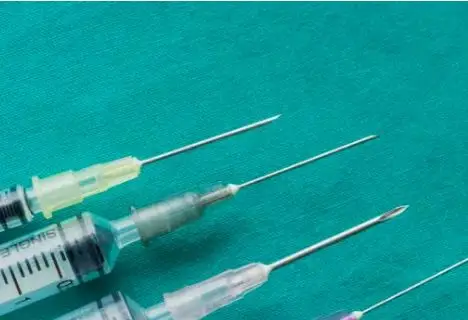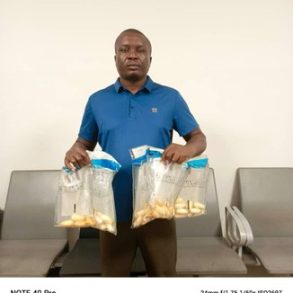The Minister of State for Health, Dr Tunji Alausa, has called for a total ban on the importation of medical syringes into the country to encourage local production and help grow the nation’s economy.
Alausa who made the call during an official visit to the ultra-modern Afrimedical Manufacturing and Supplies Limited’s syringe factory at Karameh Industrial City, Arepo, Ogun State, said the federal government was determined to provide necessary support to the local manufacturing sector to enhance its contribution to the Gross Domestic Product, GDP.
The minister who was accompanied on the visit by the Director-General of the National Agency for Food and Drug Administration and Control (NAFDAC), Prof Mojisola Adeyeye, and other top government officials, affirmed that the restructuring of syringe and needle production in Nigeria aimed to guarantee availability of high-quality products manufactured by Nigerians in the market to generate lucrative employment opportunities for Nigerians.
Imploring the National Agency for Food and Drug Administration and Control to ensure that unbridled importation of syringe does not hamper the development of local industry through unhealthy competition, he said: “Don’t give them any more authorisation to import. We need to protect the local industry through the backward integration model aimed at enhancing the local capacity.”
The minister further requested NAFDAC DG to engage all the relevant agencies to achieve the desired government policy thrust as he reaffirmed President Bola Tinubu’s commitment to remove barriers impeding industrialization and manufacturing in Nigeria.
The DG NAFDAC, Prof. Adeyeye, reiterated the need for a holistic approach by all the relevant agencies of government to solve the problem of substandard falsified medical devices coming into the country through the ports.
Adeyeye said that the agency had stopped issuing import authorization to importers, including foreign partners.
According to her, the National Primary Healthcare Development Agency (NPHCDA) had also been asked to support local syringe producers to provide job opportunities for Nigerians by expanding the operations of Nigerian manufacturing enterprises.
She noted that the National Primary Health Agency received the final import order in December 2023, with the direction to begin sourcing from local producers thereafter.
She went on to clarify that NAFDAC had prohibited syringe imports to encourage locally manufactured syringes.
This suspension, Adeyeye said, also applied to syringes previously imported by NAFDAC’s overseas partners.
The objective, according to her, was to shift the focus towards supporting domestic syringe manufacturing.
“However, for the local manufacturers, we are doing hand-holding with our Syringe companies. Hand-holding, meaning we are working with them by correcting whatever we found wrong or inappropriate in their operations, adding that this initiative has started yielding positive dividends as the World Health Organisation WHO recently requested for names of the three syringe manufacturing companies in Nigeria to do business with,” Adeyeye noted.
She stated that the names were provided to WHO, who was contacted for advice on prequalification and eventual access to the items for usage.
The NAFDAC DG, on the other hand, urged for a comprehensive strategy to combat importation of substandard and counterfeit medical devices into the country.
She revealed that some medical items were still entering the nation with the help of corrupt authorities at the ports.
According to her, the government had previously imposed substantial duties on syringe imports to discourage them.
She did, however, express sadness that the system in the ports violated that principle.
“That’s the problem. To address the issue, the government will use a holistic strategy. NAFDAC, SON, and Customs are not the only agencies capable of doing so”, Adeyeye said.
The NAFDAC boss acknowledged that the syringes made locally could be a bit more expensive, but she also said that the price would drop as the local sector gained more traction.
In addition, she encouraged the government to lower import taxes on essential equipment and raw materials used in domestic production, saying that they should be exempted from duties for a certain period.
Adeyeye stated that NAFDAC had the authority to impose a ceiling on imports, adding that the three Nigerian firms were capable of producing enough syringes to meet local demand while still exporting.
The Chairman of Mikano International, the parent company of Afrimedical Manufacturing and Supplies Limited, Mofid Karameh, told the visiting top government officials and UN Deputy Secretary-General that his company was poised to revolutionize the landscape with its aim to restore Nigeria as the premier hub in Africa.
He said the company boasted of an internationally accredited factory with an annual production capacity of 1.8 billion syringes, employing cutting-edge E-beam sterilization technology.
Founded in 2019, Afrimedical has emerged as a prominent provider of medical solutions, delivering products such as 2ml, 3ml, 5ml & 10ml sterile hypodermic syringes, 0.5 ml auto-disable immunization syringes, face masks, and sanitizing tunnels. Afrimedical Manufacturing and Supplies Limited, a division of Mikano International Limited manufactures hypodermic syringes and other healthcare products, providing solutions to Africa’s health needs and saving lives.
Tailored to protect medical institutions and professionals in Nigeria and throughout Africa from virus-related infections, Karameh said these solutions showcased Afrimedical’s commitment to healthcare safety.
In the view of the Managing Director of Afrimedical, Akin Oyediran, the company planned to manufacture high-quality syringes, not only for Nigeria, but also for some neighbouring countries.
He added that the company used 30 per cent less plastic with high-quality medical-grade materials in its production.





